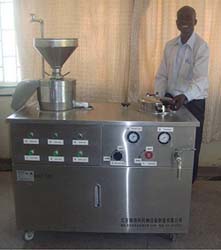One of the larger challenges to those working in program outreach activities is linking "at least half of the farming communities" to legume processing initiatives. This target of course grows as more farmers participate in the program, for example over three years the number of groups participating in west Kenya is currently 26, suggesting that 13 processing operations need be established. We responded by preparing the handbook "Grain Legume Processing Handbook: Value Addition to Bean, Cowpea, Groundnut and Soybean by Small-Scale African Farmers" (40 pp) and organizing a course around it attended by 18 participants. The simple "mince and press" approach to making soymilk attracted considerable attention and we focused our first efforts around establishing soybean "dairy" operations by assembling and distributing 12 kits consisting of a mincer, soaking basin, filters, press plates and pasteurizing pans. This approach met with moderate success, with women meeting in the late afternoon to take turns mincing their soyabeans for use in the evening meal at a rate of about two tons per month. One partner later established a shop that markets a full range of soybean products including snacks, fruit soyamilk yoghurt and blended flours. On paper at least we had achieved our 50% target but then an additional exciting opportunity arose.
|
The United Nations Industrial Development Organization (UNIDO) and the Government of Japan announced plans to establish three soyabean processing factories in west Kenya using state-of-the-art Japanese equipment intended to produce emergency relief food for the Kenyan Red Cross. Arrangements were forged with the Kenyan Ministry of Industrial Development to accommodate these factories and six trainees were sent to Japan to gain experience with the machinery and processes. At first, N2Africa was asked to guarantee supply of about 220 tons of soyabeans per year, but then our interaction with the project increased. |
 |
Photo: This state-of-the-art soya milk processor was provided through UNIDO and was installed at one of three factories in west Kenya (photo credit Josephine Ongoma) |
Mrs. Josephine Ongoma, one of the N2Africa Node Leaders in west Kenya, was recruited by UNIDO to serve as National Coordinator to oversee the installation of the equipment and to launch factory operations. Factories able to process about 45 kg of soyabean per hour are now under development in Migori, Kisumu and Malakisi. Each will specialize in a different range of soya products. Soymilk will be used in school nutrition programs (see photo). Fortified blends will be used in famine relief by the Red Cross. Other mechanisms are being explored so as not to interfere with local entrepreneurial opportunities. From its modest attempts at the cottage industry scale designed to improve household nutrition, soyabean processing within the program has grown to represent a considerable market for west Kenya’s farmers and a great opportunity to better respond to humanitarian crises in Africa.
Paul L Woomer, Kenya Country Mentor
